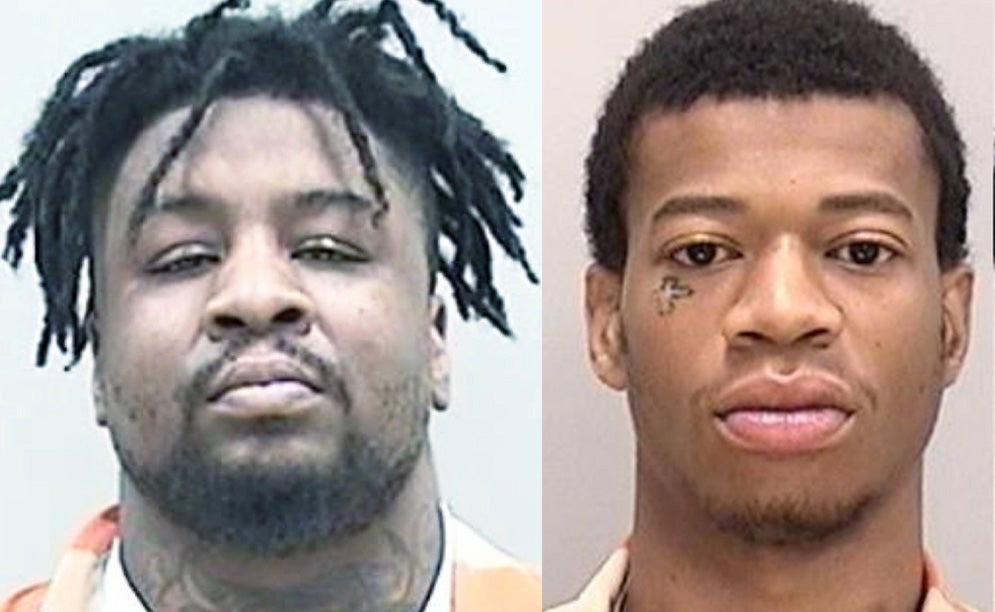Two men were sentenced to life without parole Friday for what prosecutors said was an execution-style hit they took out at an Augusta gas station.
Artavius Ward and Keshun Carswell, who are both 30, were accused of gunning down 18-year-old Brian Harris Jr. The killing took place April 19, 2019, at a Chevron Food Mart on Gordon Highway.
After deliberating less than three hours, the jury found both men guilty on seven related counts, including malice murder, felony murder, possessing a firearm while committing a felony and aggravated assault.
Ward and Carswell each were accused of shooting at Harris in the back seat of a car, while the seven bullets that entered the left side of his body came from Ward’s gun.
Superior Court Judge John Flythe sentenced both to life without parole.
Defense attorney Tanya Jeffords, who represented Carswell, begged the court to treat his case differently, since he hadn’t fired the fatal shots.
“I’m asking you, your honor, to look at the differences,” Jeffords said.
What’s taking place in the community is a “genocide” that society never tries to explain, she said.
“I’m asking you to look at punishment in the sense of he didn’t lay a bullet in anybody,” she said.
Prior to his sentencing, Carswell’s mother apologized to Harris’ family.
She said her son had been a good student at Grovetown High School and played in the band for many years.
“I am so sorry. I have been sorry from Day 1. My heart bleeds,” she said. “Please give him a chance.”
But Harris’ aunt said she can no longer look her devastated sister in the eye because she lost her only child.
Harris was the “spitting image” of his father and had a baby on the way, she said.
“I ask you to have the same mercy on the two men who killed him as they had for him, which was nothing,” the aunt said.
Ward claims self-defense
During the investigation, deputies determined Harris had been selling marijuana and that his friends removed the drugs, money and a gun from his body after he was killed.
Ward, who testified on his own behalf Thursday, claimed he tried to buy marijuana from Harris earlier that day and that Harris had robbed him of cash.
At the Chevron, he approached the vehicle Harris was in and asked his name, Ward said, as an “older guy talking to a younger guy.”
Ward claimed he had no plan to commit violence but that Harris pointed a gun at him, so Ward shot him in self defense.
The prosecution’s explanation was that Ward and Carswell had a chance encounter with Harris, but on seeing him decided to exact revenge for the morning robbery.
They pulled their car in front of the one Harris was in to block it, and got out without guns drawn to not alert Harris, who didn’t fire a single shot, of their intent, Chief Assistant District Attorney G. Kevin Davis described.
A video of a video
The case relied heavily on a video of a cell phone video captured from one of the security cameras at the Chevron.
It showed the two women riding with Ward and Carswell “running from the car” before the shooting, Davis pointed out. “They knew,” he said.
Carswell has been in contact with Loyalty Over Everything gang members within the last two weeks, and never agreed to testify against Ward, Davis said.
While Ward had no prior felonies, Davis said Carswell had been through the court system 16 times.
Flythe called the frequent homicides, typically conducted over small amounts of drugs or money, “a cancer in our community” for which life sentences are only a symptom.
“I feel like sometimes while it feels good to keep giving people second chances, you end up creating something like this,” he said after the verdict, prior to sentencing Carswell.
Lead investigator for the Richmond County Sheriff’s Office Lucas Grant testified during the trial that mistakes were made in the investigation, including his misidentification of the model of Harris’ gun.
Grant testified that it was not unusual for Harris’ friends to flee after his death and hide his drugs and weapon.
“They knew their friend had been killed in front of them,” he said, so they “got rid of things that would make him look bad.”
Attorney for Ward, Keith Johnson, and Jeffords drilled law enforcement with questions about how the investigation was conducted.
This included why interview recordings were lost and footage was not presented from some 13 other security cameras at the Chevron.
Johnson said in closing arguments the case was about “split-second decisions” and “protecting oneself.”
Two men and two women stopping at a gas station doesn’t support prosecutors’ theory of an “execution,” he said.
Instead it was “a horrible coincidence,” Johnson said. “There are not too many hit men without a record.”








